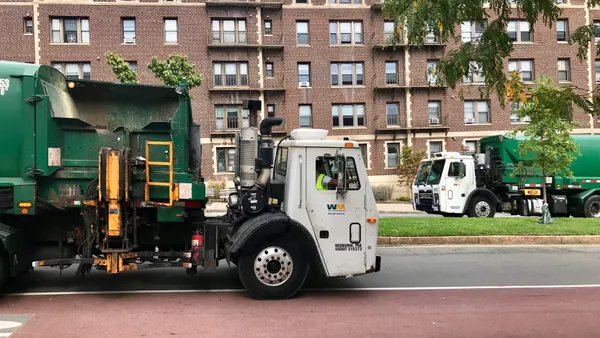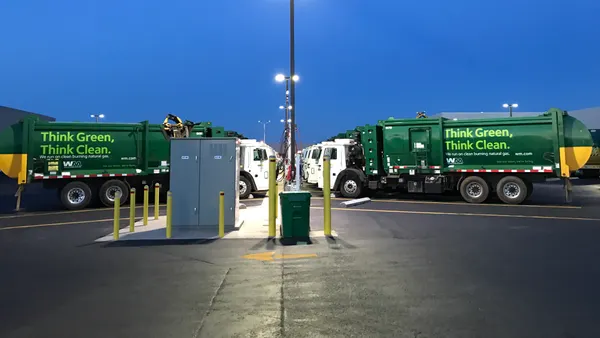Dive Brief:
- Sanitation Salvage has notified New York's Business Integrity Commission (BIC) of plans to surrender its operating license and cease operations immediately, as first reported by the New York Daily News. In that same story, the New York City Housing Authority also confirmed plans to cancel a collection contract with the company worth more than $1 million.
- In a letter to BIC, Sanitation Salvage's lawyer wrote that a recent one-month emergency license suspension "doomed the company" and described city efforts to place customers with other haulers as "unlawful." Sources indicate this customer list has since shrunk from more than 6,000 to an estimated 2,100.
- As a result, Sanitation Salvage said it can no longer afford to pay for increased activity from a city-mandated auditor. According to the company, this has left it "with no choice but to surrender its license rather than incur further operating losses, which would only impede the company’s ability to engage in an orderly and expedited sale of its assets.”
Dive Insight:
Not since the organized crime crackdown in the late '90s has a company of this size been felled by regulatory and political pressure in New York. Once among the largest private haulers in the city, Bronx-based Sanitation Salvage has undergone a striking downfall amid a tumultuous year for the local industry.
Due in large part to a series of articles by ProPublica, the company's safety record and labor practices have become a primary focal point. These include 58 collisions in the past three years, two fatal crashes in the last year (one involving an off-the-books worker and alleged cover-up) and an estimated $385,000 in back pay. BIC's decision to suspend the company's license in August, followed by a lawsuit from the company and a reinstatement under auditor oversight in September, have further escalated the attention.
Sources confirm the company never fully recovered from that suspension, and other indicators show resources may have been waning. According to city records, Sanitation Salvage's traditional level of lobbying expenses with powerful firm MirRam are down for the year. Marino, an outside PR firm hired in June and active as of October, is also no longer representing the company.
Following this news, the main question is what will happen to its remaining customers. A tight labor market made it challenging for competitors to pick up much excess volume on short notice during the suspension. Some customers had also come to expect Sanitation Salvage's low prices.
Besides offering assistance for displaced customers, BIC hasn't released an official statement. Multiple industry trade associations, including SWANA and New Yorkers for Responsible Waste Management (NYRWM), have offered to do the same. During the suspension period, New York's Department of Sanitation (DSNY) stepped in for longer than expected to temporarily service a number of these accounts. DSNY confirmed to Waste Dive it will collect affected public housing sites, but no commercial accounts.
Labor and environmental advocates have continued to push for the company's closure throughout this process and had planned a City Hall rally today to intensify the pressure. That event has since been converted into a victory rally as well as an opportunity to beat the drum for upcoming commercial waste franchising legislation.
"In the coming months, we will be working in the City Council to pass the strongest possible commercial waste zone policy to ensure that no company like Sanitation Salvage operates in our city again and no worker is ever again treated like Mouctar Diallo was treated," said Teamsters Local 813 President Sean Campbell in a statement beforehand.
DSNY recently released a formal proposal for the aforementioned franchise zones, and expects to see legislation introduced that could codify the plan next year. Many industry companies remain opposed to the concept, pushing instead for a separate reform bill.
“Safety must be a priority for both public and private sector waste service providers, and the decision by Sanitation Salvage to cease operations offers important lessons for the City and the industry at this critical juncture," said NYRWM Executive Director Kendall Christiansen in a statement. "This development affirms that the City’s existing regulatory structure provides considerable tools to promote safety and address other needs while maintaining an open-market system that ensures good customer service, competitive pricing and innovation."
This discussion will now proceed without the active participation of the once-dominant Sanitation Salvage, though the founding Squitieri family does still have an ownership stake in one of the city's largest transfer stations which recently joined a lawsuit led by the NWRA against a new capacity reduction law.












